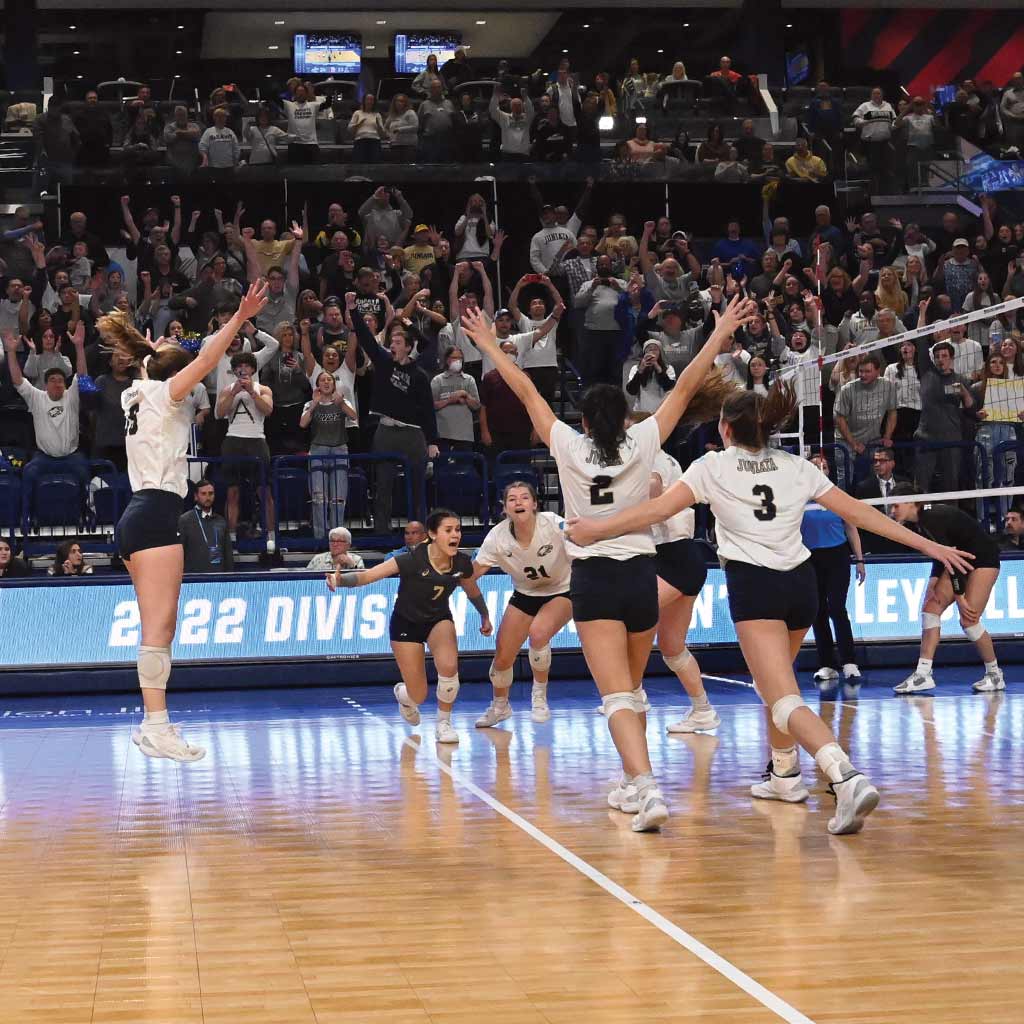It was all too much for Trinity.
Juniata’s setter, Olivia Foley ’24, redirected a pass precisely for middle hitter Courtney Williams ’25, who met it with a quick, heavy swing on the rise, sending over the net what would become the 52nd and final kill of the NCAA championship.
The scrambling Trinity side mishandled Williams’s spike, sending a reply harmlessly out of bounds.
In straight sets, 25–17, 25–11, 25–23, and with a stream of jubilant white jerseys crowding the court, Juniata College became the 2022 Division III women’s volleyball national champions.
“All you see is Juniata fans jumping up and down,” said Foley of the atmosphere of the November 19, 2022, final. “It almost was like a blur.”
The Saturday night celebration of the raucous, semilocal crowd in Pittsburgh’s 3,500-seat UPMC Cooper Field House reached a crescendo, including the Screaming Eagles Pep Band; student, faculty, and staff supporters visiting from Huntingdon; family members who had traveled from as far away as California and Puerto Rico; and volleyball alumni wearing jerseys (some with old-school buttons and a collar) from their own glorious playing days.
“Alums go out of our way to be there in any way we can,” said Katie Charles ’05, a starter for Juniata’s first national championship team in 2004 and current Southern California resident who joined several alumni watching the live link to the NCAA broadcast together on Zoom.
Juniata women’s volleyball improved to 3–6 in NCAA tournament finals, a remarkable record of success for a tiny college competing in a division of nearly 450 programs. Juniata’s 1,500 students are a small fraction of the undergraduate population of many of its top national rivals, such as Emory, Johns Hopkins, Ithaca, and Washington-St. Louis. (Indeed, 41% of Juniata students are student-athletes.)
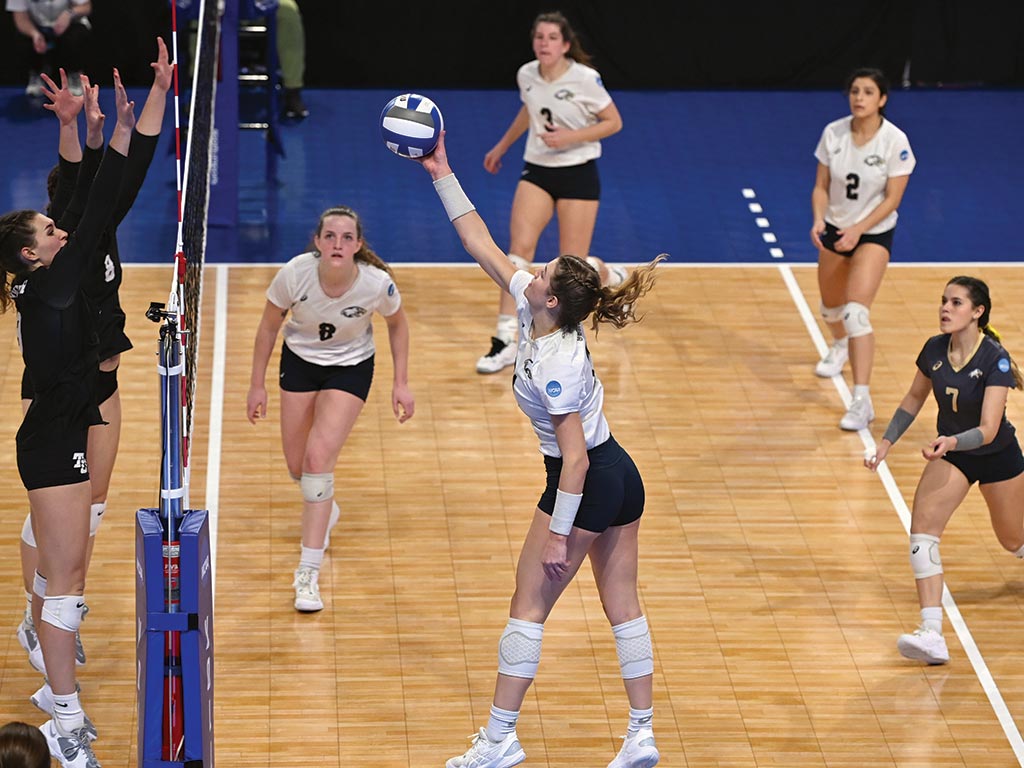
“Juniata has been an overachiever over the years, competing against universities with 10,000 students,” said coach Heather (Blough) Pavlik ’95. “Tough, resilient, sometimes overmatched, Juniata functions best when it’s the little engine that could.”
That “little engine that could” is one of the dominant programs of Division III. They were the 2022 tournament’s top seed, dropping just two sets in their six-game steamroll to the title.
“It was kind of like a fever dream, just how cohesively the team played. I don’t think we’d be able to replicate that,” said Abbey Telesz ’25, a setter who saw action in the final as a substitute. “Seeing the support from the school, and from men’s and women’s volleyball alumni, it made me realize we weren’t just there playing for ourselves, but also playing for people who paved the path before us.”
By August 1977, Larry Bock’s years as a club volleyball standout at Penn State were long behind him. He had two young daughters and ran consumer and agricultural lending at a local bank in Huntingdon. Why would Bock expect anything other than a quiet career as a loan officer? Little did Bock know, he was about to start one of the most consistently successful sports programs in NCAA history.
It started with a phone call that August from an acquaintance named Bill Berrier ’60, Juniata College’s athletic director. “Title IX was just getting off its feet,” Bock recalled. “Everybody was trying to add women’s sports.”
“We need you,” said Berrier, who convinced Bock to take a $400 salary to inaugurate a women’s volleyball program as part-time coach.
At the Juniata gym, Bock met a collection of fine athletes, mostly basketball players trying out a second sport. Bock quickly set about building a competitive culture for the new program.
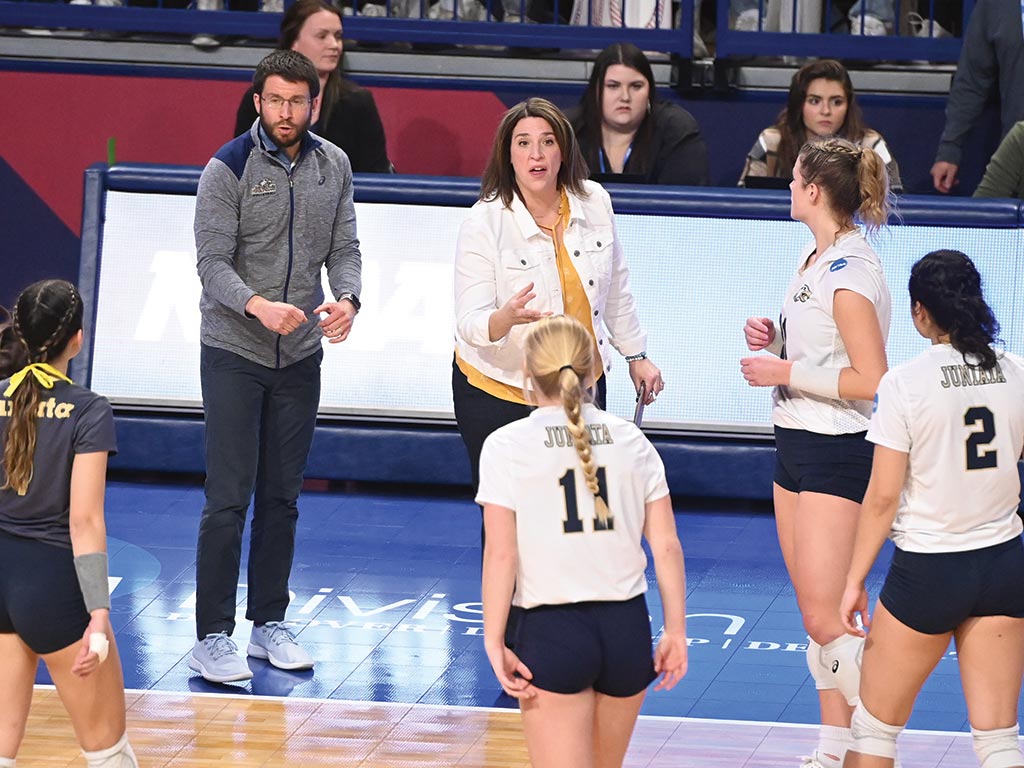
“Larry’s expectation was to win,” Pavlik said, “to outwork the opponent.”
Bock’s first group of naturally gifted athletes laid the foundation for the only program to qualify for every Division III women’s volleyball championship since the tournament’s inception in 1981, including a national runner-up finish that first year.
“That original group, they’re still my heroes,” Bock said. “We packed everybody into one small van, rode all over the country, ate McDonald’s for most meals and slept in Motel 6.”
The Eagles finished second at the national championship three more times in the 1990s, the first of those with Pavlik as its First Team All-American setter.
Pavlik soon became Bock’s associate head coach, and Juniata broke through at last with a pair of NCAA championships in 2004 and 2006. Pavlik took over for Bock following the 2010 season without a blip in the continuity of success.
Bethany (Kozak) Chamberlain ’09, the setter for the 2006 championship team, has watched the transition with awe.
“The team continues to thrive,” Chamberlain said. “Larry, of course, gets most of the credit since he was the one to start this program, but Heather’s continued leadership after Larry kept that culture going.”
Players describe Pavlik and her associate head coach, Casey Dale ‘07, as quiet leaders who make themselves available as resources but generally let their players, especially the upper-level students, resolve any intrasquad conflicts.
“Their style of coaching is so motivational,” opposite hitter Lily Podolan ’25 said of Pavlik and Dale. “During practice, they critique us. During the game, they trust us. They know that we work best when we figure it out as a team.”
Against Trinity, the Eagles applied contrast pressure with a high-percentage attack that included stellar serving that flew like a butterfly and stung like a bee.
“Through good luck or good management at Juniata, we’ve always had terrific athletes who beyond that were really good people,” Bock said. “It’s a sisterhood that carries everybody through. The older ones put the younger ones on their shoulders.”
“Juniata has been an overachiever over the years, competing against universities with 10,000 students...Tough, resilient, sometimes overmatched, Juniata functions best when it’s the little engine that could.”
Coach Heather (Blough) Pavlik ‘95
Along with their athletic success, Juniata athletes excel academically.
“In the end,” Pavlik said, “the most important thing they gain from college is the education.”
While the cumulative GPA for all Juniata students was 3.288, and 3.381 for Juniata student-athletes, the champions’ average was 3.53 — remarkable for a team that made such a long a run to the title that meant frequently missing classes and taking exams on the road proctored by coaches. According to Ayers, student-athletes perform better during the season than the offseason because of the structure and time management skills athletes must apply in-season.
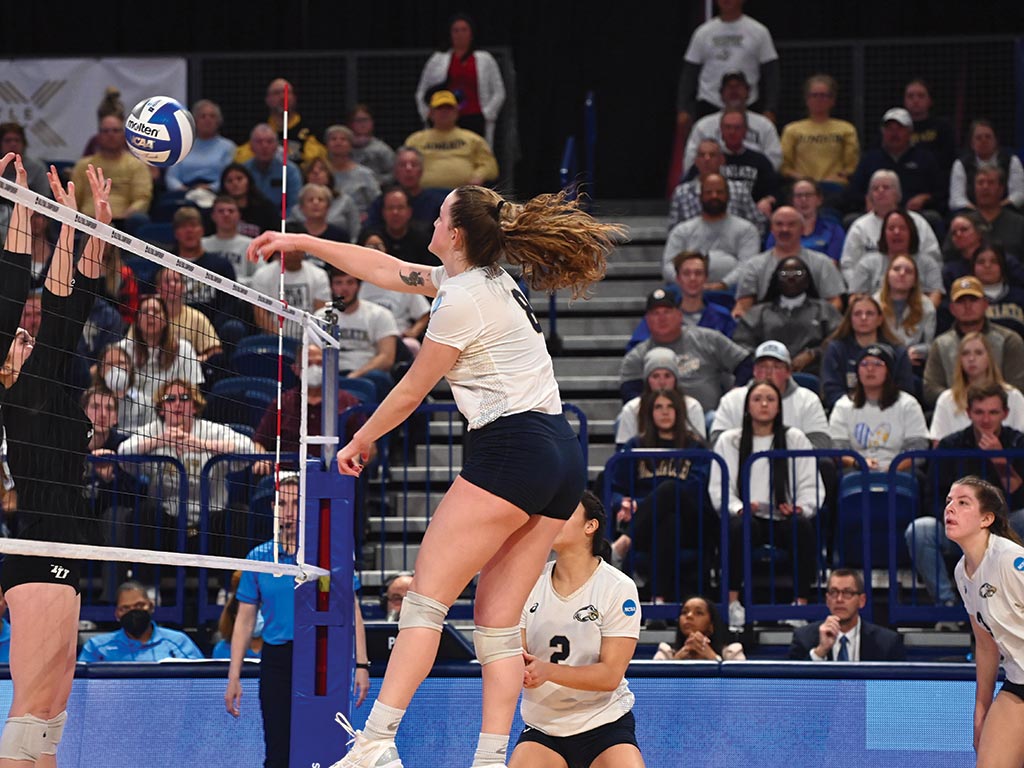
“It was a hard transition coming here alone from Puerto Rico,” said libero Kiona Sky Rousset-Hernandez ’24, whose mother and father flew north to attend the final. “It hasn’t been an easy road because of how far away from my family I am. But I can go talk to Coach Pavlik or Coach Casey; they’re really trustworthy. I wasn’t open to receiving help. They’ve helped me learn that receiving help is a strength, not a weakness.”
During warmups before the final that Saturday night in Pittsburgh, Amy (Heptner) Mathur ‘96”, associate professor of English, locked eyes with Podolan, one of her students, and, in a practiced routine, made a spiking motion that Podolan then imitated.
“We’re a small place,” said Mathur, a major team supporter among Juniata faculty who made the three-hour drive west with her sons. “We sell this school on relationships between students and faculty members. I know how important it was to me to see my professors at my games.”
Mathur played point guard for Juniata women’s basketball in the mid-1990s when Pavlik starred as the volleyball team’s setter, and the two women share the same hometown of Johnstown, Pennsylvania.
“I’ve seen her deflect congratulations multiple times,” Mathur said of Pavlik. “She deserves all the accolades. She has been a standout at every level, and to see her have that trophy, it was really beautiful for us.”
Trinity had handed Juniata its only loss of the 2022 season in an early-season match in San Antonio when the Eagles were dealing with some injuries and rotations were not set. The final would be quite different.
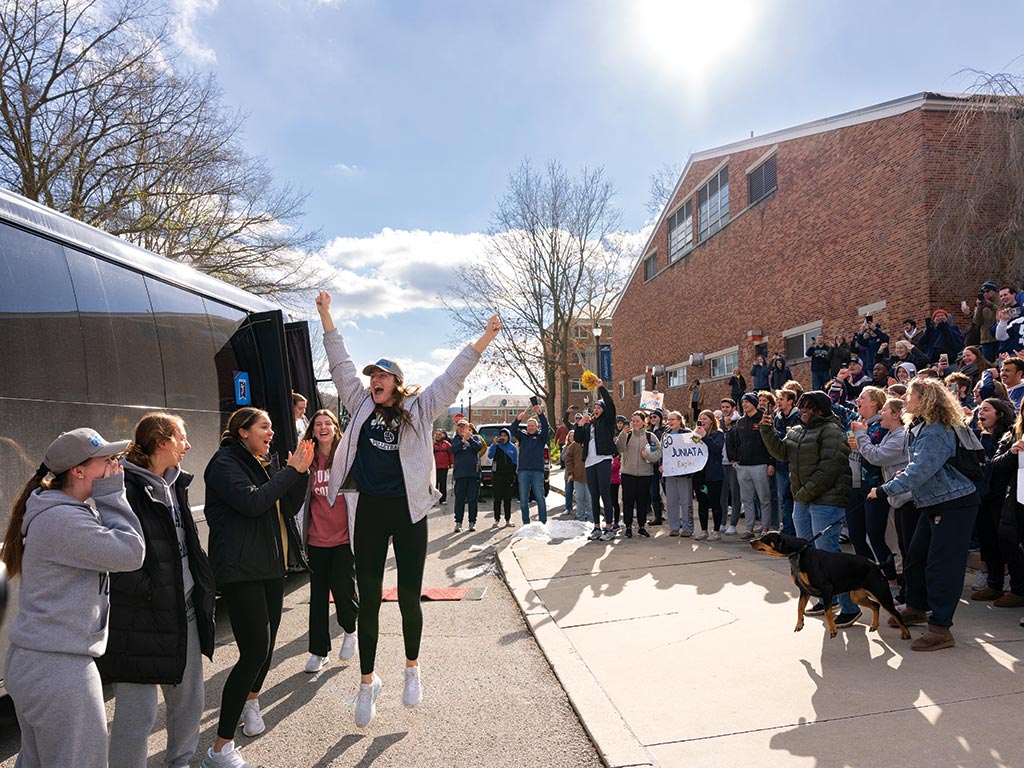
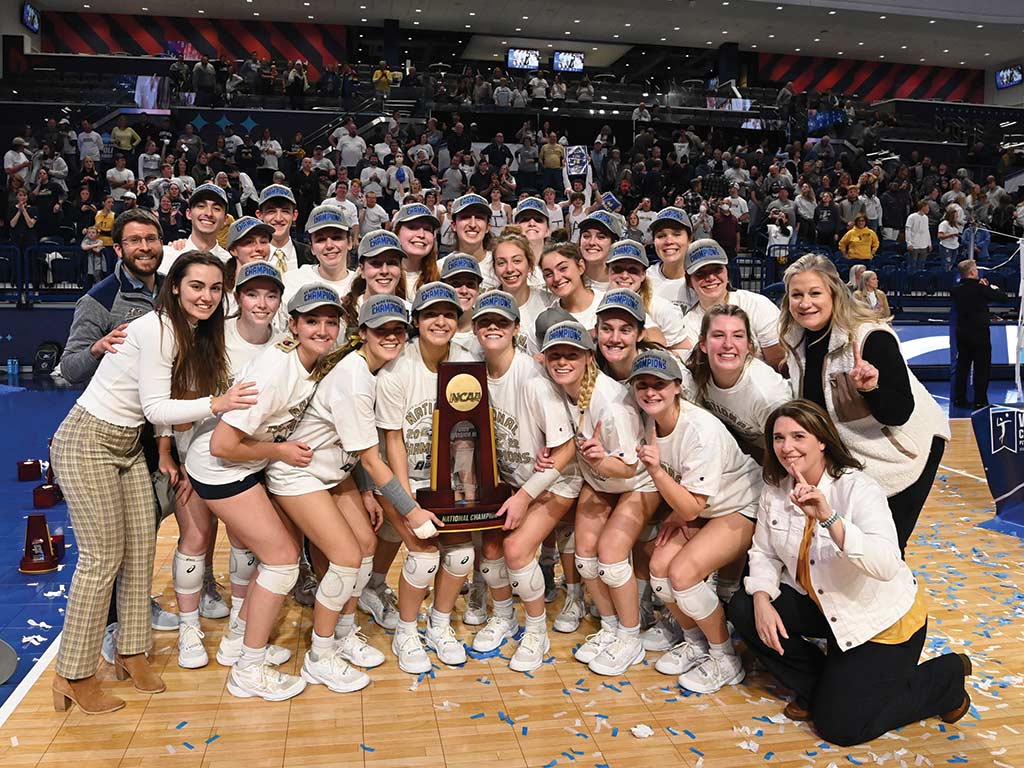
“We wanted to show them what we really had,” Rousset-Hernandez said. “When we practiced the day before the final, everyone was clicked in. We knew this was our trophy.”
Just five points into the first set, Nikki McLellan Ayers ‘06, Juniata’s athletic director, turned to her husband and made a bold pronouncement: “It’s done,” Ayers said. “We’ve got it.”
Indeed, the outcome was never in doubt as the Eagles (38–1) avenged their only loss of the season in three dominating sets.
“I was very nervous, but once we started warming up, feeling everyone else’s confidence made me feel super confident,” said middle hitter Mackenzie Coley ’25, the team’s only First Team All-American, who tied with Podolan for the team lead with 12 kills in the final. “We just had a fire in us.”
Moments after match point, Pavlik enveloped Dale in a hopping, rotating embrace.
“Heather and Casey [Dale] teach and coach the game at the state of the art,” Bock said. “They outwork everybody else throughout the course of the recruiting and the competitive parts of the year. That results in having really good, well-trained athletes.”
The Eagles have hung their third championship banner, distributed championship rings, and are well into their offseason conditioning program of weight lifting and individual practice.
“Back to work,” said outside hitter and defensive specialist Kennedy Christy ’24. “It can be easy to get caught up in big wins. But celebrating shouldn’t be at the top of our priority list. Juniata recruits so many great athletes, there’s no guarantee that I’m going to see the court next season.”
Added Foley: “Our journey for next season has already started. It’s been a long time since teams have won two in a row. Pressure like that is a privilege, not something to turn away from. Rather, you run right toward it.”

